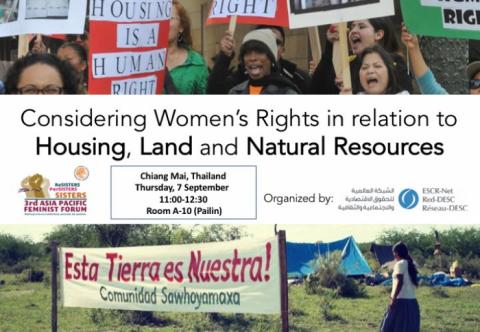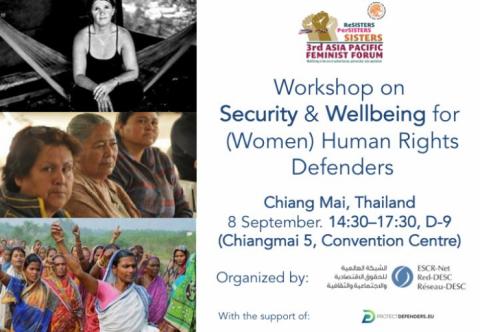
Contributing to a growing women’s rights movement in the Asia Pacific region
Via participation of several member representatives and several workshops, ESCR-Net participated in the Asia-Pacific Feminist Forum (APFF) which took place in Chiang Mai, Thailand, between 6-9 September 2017.
Organized by the Asia Pacific Forum for Women, Law and Development (APWLD), the APFF brought together more than 300 activists from across the Asia Pacific region to strengthen women’s movements in the region and advance strategies to dismantle those systems and structures that perpetuate inequality, drive climate change, and routinely violate women’s human rights.
Facing a growing climate crisis and the exploitation of both paid and unpaid work of women, participants came together, under the slogan: “reSisters, perSisters, Sisters” to challenge global corporate capitalism, patriarchal authoritarianism and neoliberal economic policies by strengthening women’s movements and articulating alternative models.
ESCR-Net coordinated two workshops at the APFF. The first workshop, called Considering Women’s Rights in Relation to Housing, Land and Natural Resources addressed the ways in which land, housing and natural resource rights are critical for women to provide for their needs, and the needs of their families and communities, while allowing them to build resilience in the face of other challenges. Yet, according to a series of findings identified collectively by members of ESCR-Net’s Working Group on Women and ESCR, women face substantial challenges in realizing their rights. Challenges include the lack of security of tenure and, often concurrently, forced evictions and displacement which is often perpetuated by unjust development models which drives land grabs and real estate speculation and gentrification. They also include legal and societal frameworks that perpetuate gender stereotypes with regards to housing, land and natural resources, as well as patriarchal cultural practices which restrict women’s ability to inherit and own property in some parts of the world. Economic policies promoting predominant roles for private investors in land use and management (for example, via the proliferation of public-private partnerships) were also identified.
These points were underscored by contributions made by representatives of several ESCR-Net organizational members, including Pauline Vata from Hakijamii (Kenya), Niki Gamara from Defend Job (Philippines) Noraeri Thungmueangthong from Indigneous Womens Network (Thailand), a member of the Asia Indigenous Peoples Pact, in addition to remarks by Shobha Shukla from Citizen News Service (India), Ravadee Prasertcharoensuk from Sustainable Development Foundation (Thailand) and Chanda Thapa (Nepal) from Asia Indigenous Peoples Pact.
The second workshop focused on Security and Wellbeing for (Women) Human Rights Defenders. Framed initially by comments offered by Chanchana Chakma of the Bangladesh Indigenous Women’s Network (Bangladesh), a member of the Asia Indigenous Peoples Pact, Niki Gamara from Defend Job (Philippines) and Chanda Thapa from the Asia Indigenous Peoples Pact, participants identified several types of security threats facing women human rights defenders (WHRDs) working in the Asia-Pacific region. These include harassment, physical threats against women working in militarized situations or areas where armed conflict is present, criminalization of human rights defenders, the occurrence of NGO laws that restrict the ability of civil society groups to receive funding from international sources and digital surveillance. Participants then engaged in an interactive exchange of experiences – both regarding the threats participants faced as well as effective strategies employed to counter or manage those threats. Following the workshop’s conclusion, participants were offered a series of resources related to security and protection for human rights defenders, including women.
The workshop on security was made possible due to the support of ProtectDefenders.eu, the European Union Human Rights Defenders mechanism, established to protect defenders at high risk.

